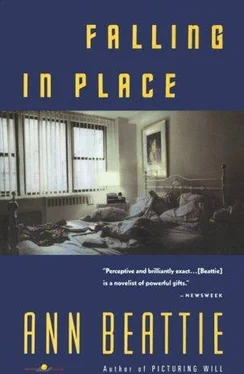Ann Beattie - Falling in Place
Здесь есть возможность читать онлайн «Ann Beattie - Falling in Place» весь текст электронной книги совершенно бесплатно (целиком полную версию без сокращений). В некоторых случаях можно слушать аудио, скачать через торрент в формате fb2 и присутствует краткое содержание. Год выпуска: 1991, Издательство: Vintage, Жанр: Современная проза, на английском языке. Описание произведения, (предисловие) а так же отзывы посетителей доступны на портале библиотеки ЛибКат.
- Название:Falling in Place
- Автор:
- Издательство:Vintage
- Жанр:
- Год:1991
- ISBN:нет данных
- Рейтинг книги:4 / 5. Голосов: 1
-
Избранное:Добавить в избранное
- Отзывы:
-
Ваша оценка:
- 80
- 1
- 2
- 3
- 4
- 5
Falling in Place: краткое содержание, описание и аннотация
Предлагаем к чтению аннотацию, описание, краткое содержание или предисловие (зависит от того, что написал сам автор книги «Falling in Place»). Если вы не нашли необходимую информацию о книге — напишите в комментариях, мы постараемся отыскать её.
Falling in Place — читать онлайн бесплатно полную книгу (весь текст) целиком
Ниже представлен текст книги, разбитый по страницам. Система сохранения места последней прочитанной страницы, позволяет с удобством читать онлайн бесплатно книгу «Falling in Place», без необходимости каждый раз заново искать на чём Вы остановились. Поставьте закладку, и сможете в любой момент перейти на страницу, на которой закончили чтение.
Интервал:
Закладка:
When she turned on the car radio, she was in time for the golden oldie of the morning: the Doors, with Jim Morrison, singing “Touch Me.” It was followed by a shouted statement that today was an odd day, and only cars with license plates ending in an odd number could get gas. The announcer gave examples of odd numbers: one, three, five…
She thought that she did not deserve such a summer job, and that the day was going to be a disaster. She was tempted to follow the NEW YORK signs all the way to New York.
She pulled off into the breakdown lane and sat there, staring straight ahead. The windshield was dirty. Blondie was singing “Heart of Glass.” There was no real introduction to that song; it just started, sounding like music from outer space, seeming to be pulsed out instead of played. Cars whizzed by. Monday. Always a difficult day: A lot of people got depressed on Monday. In order to keep her job, it was necessary to get back onto the highway and drive to school and listen to teenagers recite lines memorized from Macbeth as they circled a wastebasket To watch Karin Larsen hold out a hand, her wrist loaded with thin gold chains, to hear her say that there was no way the hand would ever be clean.
The sun went behind a cloud, and she followed the pink cloud as the road curved, a cool breeze blowing through the window.
The Merritt Parkway was quite nice. A man in a sports car, passing her, looked over and smiled. She smiled back: They were both whizzing along, it was a fine day, they were both young.
She began to feel better. It was summer, and she was twenty-two, and she had a lover, if he ever got back from Spain. She could call the school and think of something to say. She could call and tell Diana DeWitt, the vice-principal, who wore sundresses patterned with butterflies the size of dinner plates, that driving to school she had realized that she was young. Not silly young like her students, but still young enough to know that she should be in New York today, not standing in a schoolroom that smelled like an eraser. Smiling, she knew not to call. She knew to keep going past the service area where there would be a phone.
From a phone booth on Sixth Avenue, she called Connecticut information and got the number of the school and, with horns honking and a woman singing in a loud soprano as she walked by holding a poodle on a leash, told the secretary in the principal’s office that she was in the emergency room, having her stomach pumped. A taxi screeched its brakes and honked long and loud at an out-of-state car hesitating before making a right turn.
She wandered through a store near the phone. Inside were pillows of various sizes, decorated with satin flamingoes and bits of rhinestone and lace. She particularly liked a blue satin pillow in the shape of a half moon, with a pretty lady’s face painted on it and curls of angel-white hair along the seam. A man was walking through the store, selling roses from a wicker basket. There was a tiny dog in his jacket pocket, all popping eyes and panting tongue. A woman trying on a pair of black gaucho pants bought a white rose and tapped the little dog on its nose before she stuck the long-stemmed rose through a braid that hung down the back of her head. The moon pillow was fifty dollars. She bought a gumball from the machine by the door on the way out and a parrot on a stand above the machine said “Thank you.” A salesgirl with wavy hair and red-black lipstick looked, with no expression, at Cynthia leaving. Her shirt said “God Is Coming and She Is Pissed.”
It was actually nice to be in the city without Spangle, because he liked to talk to everybody, and it was hard to make any progress. Spangle would have talked to the man with the flowers about his dog. He would certainly have said something to the salesgirl. He stopped to listen to street musicians and stayed for whole songs, even if the musicians were no good. Putting a quarter in the open instrument case, he would ask questions about their instruments, or just wonder how the day was going for them. Spangle noticed lush trees growing on the roofs of buildings, new editions of books he already owned in bookstore windows, pieces of paper advertising things he always thought would be interesting, six-toed people wearing sandals. He didn’t miss a thing. And he was always thinking that he saw someone he knew, most of them people he wouldn’t have stopped to speak to if they had been the right people: Mr. Binstock, the man who used to run the good fish restaurant oh the Cape; a friend of a friend from Cambridge, 1968, minus beard and long hair. But had that guy worn glasses? Spangle could keep it up all day. In a bar, he’d talk to the bartender, study the jukebox, read the menu even if he wasn’t eating. He would go home with a tacky rhinestone pin of a jet plane, what looked like a gnawed Tarot card found on Macdougal Street, a Lyndon Johnson key ring, a perfectly fine pen that had been lying on the sidewalk right in front of him, a record he had been looking for for ten years, an acorn that looked like a peanut, picked up in Washington Square Park. Then, at the end of the day, he would always say to her: “Do you have any idea where I parked the car?” The last time she had been in New York with Spangle he had bought a jacket in a secondhand store that fit him as well as one that had been custom-made. It was made of light-gray wool with nubs of white in it. (“It looks like a chicken picked the threads out of it! I’m going to be some lounge lizard in this one. Maybe I should get some Bryl-creem.”) Also a copy of On the Road , reissued with a new cover, a package of post cards of sporting events in China, a half-pound of chocolate cookies that looked like spun lace, and a roach clip with a little heart-shaped piece of mother-of-pearl inlaid in each side. They had had moussaka for lunch and homemade tortellini in Little Italy for dinner, and a drink in SoHo, and ice cream on Bleecker Street. “I love it,” Spangle always said, driving away, “but I don’t think I could live there. I mean: When would you think?” He would be munching on cookies from Miss Grimble’s as he shook his head and the car hit potholes, jumped up, came down again.
She had had a long and very on-and-off-again relationship with Spangle. When they had not been together for very long, he had left and gone to Berkeley. That summer he wrote to her and she sold her bicycle and some books and bought a one-way ticket to California. Most days they would go to lie in the grass and read in one of the small parks. The first week she was there, a couple had appeared with a cocker spaniel, a doberman and a goat. The goat had taken an interest in Cynthia. Spangle, playing with a Frisbee, had sailed it close to her, and the goat had bolted in terror, almost knocking her flat. Everyone ran to see if she was hurt: the goat’s owners, Spangle, the man Spangle was throwing the Frisbee with. And she couldn’t stop crying — not because of being frightened by the goat, but because it had occurred to her that she was in Berkeley, California, where she knew no one but Spangle, and that she had been in danger, even if it was just a silly sort of danger. Of course Spangle began to talk to the goat’s owner. It was an African Pygmy goat, and it was trained to pee outside; for the other, the woman said, they just picked up the pellets. The woman was a chef; the man had gotten his Ph.D. from Berkeley, writing his dissertation on Turgenev. He was unemployed. They looked familiar to Spangle, but he did not look familiar to them. Squatting beside Cynthia, Spangle had kept saying what a coincidence it was that the book Cynthia was reading was On the Eve . The four of them had gone to a coffee shop on Telegraph Avenue and left the two dogs and the goat tied outside. She and Spangle had been about to go to the movies to see Grand Hotel when he took a scrap of paper out of his pocket and saw that it was playing the next afternoon, not that afternoon. So they had stayed in the coffee shop for another cup, while Spangle and the man traded lines from Grand Hotel . They exchanged phone numbers, writing them down on napkins. They never called each other. A month later, Cynthia ran into the woman walking near the university, and they went for coffee. She gave the woman their phone number again, and the woman gave her theirs; she and Spangle meant to call, but never got around to it. Then, two days before they were leaving Berkeley, the woman called and asked them for dinner. Dinner had been three kinds of cold soup. They were serenaded by a scratchy Miles Davis record coming through one speaker, and later by a fight downstairs which ended with some woman going outside and picking up a rock from the tiny rock garden and banging it against the door, shouting through the open window to the man inside, who had long since stopped making any noise.
Читать дальшеИнтервал:
Закладка:
Похожие книги на «Falling in Place»
Представляем Вашему вниманию похожие книги на «Falling in Place» списком для выбора. Мы отобрали схожую по названию и смыслу литературу в надежде предоставить читателям больше вариантов отыскать новые, интересные, ещё непрочитанные произведения.
Обсуждение, отзывы о книге «Falling in Place» и просто собственные мнения читателей. Оставьте ваши комментарии, напишите, что Вы думаете о произведении, его смысле или главных героях. Укажите что конкретно понравилось, а что нет, и почему Вы так считаете.












